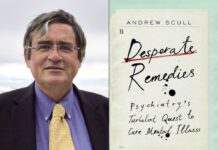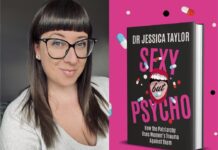Thomas Szasz Versus the Mental Health Movement
Unbiased experts must examine the claims and research of psychiatry and issue a report as to whether psychiatry not only has a valid medical basis, but whether this basis justifies the widespread violation of medical ethics and the routine use of imprisonment and torture.
Our RCT Fetish: How the “Gold Standard” for Research Has Led to A Societal...
After Joanna Moncrieff and colleagues published their study debunking the low-serotonin theory of depression, the editor of Mad in Sweden, Lasse Mattila, wrote Sweden’s...
Major Depression: The “Chemical Imbalance” Pillar Is Crumbling—Is the Genetics Pillar Next?
A more detailed critical evaluation of molecular genetic studies, which have failed to discover genes shown to cause depression.
“Holy Shit!” Psychiatry’s Cognitive Dissonance on Display
Even those who would seek to reform the profession of psychiatry cannot confront the reality that exists in the research literature
Psychiatry, Fraud, and the Case for a Class-Action Lawsuit
For decades, psychiatry committed medical fraud when it told the public that antidepressants fixed a chemical imbalance in the brain.
Loss, Grief, and Betrayal: Psychiatric Survivors Reflect on the Impact of New Serotonin Study
Loss, grief, and betrayal are felt deeply by many who have been affected by the myth of the chemical imbalance, especially now that it has been debunked.
Psychiatry Textbooks Are Filled with Errors and Propaganda
The coming generations of healthcare professionals are being taught information that is incorrect, to the detriment of their patients.
Catherine’s Story: A Child Lost to Psychiatry
A year ago today, our youngest child died, thanks to the adversarial actions and toxic treatments foisted on her by medical-model psychiatry. By telling her story, we hope to promote systemic change.
Suicide Hotlines and the Impact of Non-Consensual Interventions
Those struggling with suicidal thoughts may stay silent instead of reaching out to suicide hotlines because they fear non-consensual intervention and the harmful impact of police involvement.
The Parts Within Us: An Interview with Richard Schwartz, Creator of Internal Family Systems
IFS is a different paradigm, which says that rather than being a sign of pathology, it’s the nature of the mind to have “parts." We’re born that way because they're all valuable.
Andrew Scull—Desperate Remedies: Psychiatry’s Turbulent Quest to Cure Mental Illness
Sociologist and author Andrew Scull discusses the history of psychiatry's "Desperate Remedies," from lobotomy and the asylum to the failures of today's drugs and the fads of ketamine and deep brain stimulation.
Laura Van Tosh: The Life of a Psychiatric Survivor Activist
Laura Van Tosh has been a leader in psychiatric survivor circles for 40 years, working at local, state and national levels.
Pathologized Since Eve: Jessica Taylor on Women, Trauma, and “Sexy but Psycho”
Our guest today is Jessica Taylor, author of Sexy But Psycho: How the Patriarchy Uses Women’s Trauma Against Them, which was published in March...
Point/Counterpoint: What Is the Importance of Nassir Ghaemi’s Conclusion that Psychiatric Drugs Do Not...
A dialogue between Jim Phelps and Robert Whitaker about Nassir Ghaemi's latest article, which concluded that psychiatric drugs, except for lithium, do not provide a long-term benefit.
Psychiatric Drugs Do Not Improve Disease or Reduce Mortality
Nassir Ghaemi: “Most psychiatric medications are purely symptomatic, with no known or proven effect on the underlying disease. They are like 50 variations of aspirin, used for fever or headache, rather than drugs that treat the causes of fever or headache.”
Behaviorists Must Confront Psychiatry’s Pseudoscience
Despite the well-documented greater effectiveness of behavior therapy, psychiatry's choice of treatment for mental disorder heavily favors drugs.
Tara Thiagarajan: Mental Well-being Better in Venezuela than in United States: Why?
Tara Thiagarajan is founder and chief scientist of Sapien Labs, a nonprofit organization that runs the Mental Health Million Project, we discuss its annual Mental State of the World Report, which uses an online survey to track mental wellbeing among internet-enabled populations around the world.
The New York Times Comments Section: A Literary Rorschach Test for the Masses
Bergner’s piece in The New York Times challenged the illusions of psychiatry. That made some people angry, outraged, or scared. The result is their comments section.
Risk of Depression Spikes When Kids Take Ritalin
Risk of depression increased when children were taking methylphenidate for ADHD, but once they stopped taking the drug, depression risk dropped to normal levels.
Called by God: Dealing With Depression and Psychosis
God supported me during my psychosis. I was afraid that I would lose God when I took antipsychotics again. That had happened after my first forced medication.
Is Mad in America Doing More Harm Than Good?
A dialogue between Dr. Jim Phelps—a psychiatrist who questions whether MIA is doing more harm than good by reporting the results of long-term trials of psychiatric drugs—and Robert Whitaker, founder of MIA.
Thomas Insel Makes A Case for Abolishing Psychiatry
In his new book, former NIMH director Thomas Insel, while exploring the causes of poor mental health outcomes in the United States, omits any mention of NIMH studies that tell of how the drugs worsen long-term outcomes.
A Tribute to Dr. Dean K. Brooks: The Fire Still Burns
Stories of a state hospital leader who challenged the mental health system by placing patients as the most important people: Dr. Dean K. Brooks of Oregon State Hospital.
Books Under Review: Spring 2022
Reviews of four recent books reflecting various perspectives on the mental health system.
Psychiatric Drugs Increase Dementia Risk Threefold After COVID in 65+ Population
Hospitalized COVID patients over 65 were three times as likely to receive a dementia diagnosis if they took psychiatric drugs.

































